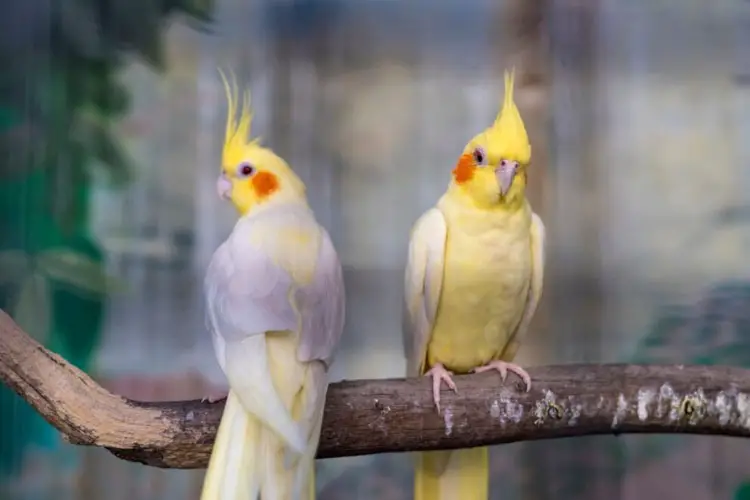To be able to give your pet the greatest care possible, you must have a thorough understanding of its behavior. Unexpected behavioral changes may signify very important things, such as whether or not your birds are stressed or anxious. If nothing is done about it right away, your cockatiel’s health may suffer.
How to identify a stressed cocaktiel? There are several habitual, behavioral, and even physical changes in your cockatiel that might suggest stress. Weight reduction, feather loss, and stress bands on feathers are all common physical changes. Behavioral changes may include a loss of appetite, unanticipated hostility, and changes in how it regularly communicates or sings.
To give you a clearer idea, we’ll not only go over how to spot signs of stress in your cockatiel but also how to deal with it and help it calm down and relax. So continue reading!
Physical Changes that Can indicate a Stressed Cockatiel
We will now discuss in detail the physical changes within your cockatiel that show that it is stressed.
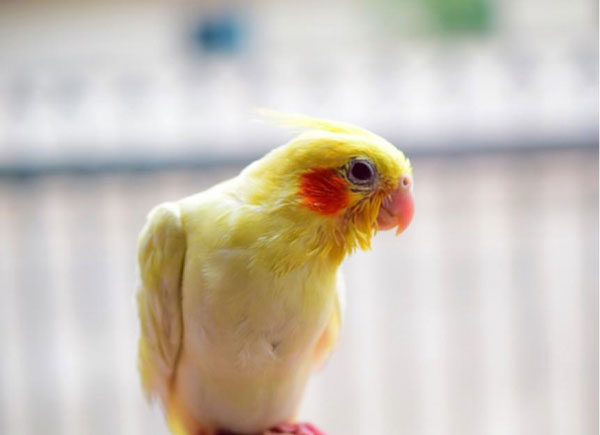
Observe The Feathers
Let’s begin by looking at the feathers. Due to improper nutrition usage, a cockatiel under prolonged stress may not be able to produce feathers correctly. Most of the nutrients get soaked up by maintaining the vital organs.
Look Out For Stress Bars
Another significant way to determine whether your cockatiel is stressed is by looking for stress bars or stress lines. These are thin lines through the feathers of your cockatiel running at an angle to the shaft. These lines or bars have a discolored or gray appearance.
Appearance
If your cockatiel is stressed, parts of its body may appear bald. Your cockatiel may pull out its feathers if it continues to feel stressed due to extreme preening. Preening is a behavior that birds engage in to relieve tension or fright.
Diet
A stressed cockatiel might not be able to eat effectively or benefit from it. resulting in weight loss. However, it is often very difficult to tell whether your cockatiel is becoming skinny. Try feeling for the breast bone, if it is too noticeable, your bird might be skinny.
Behavioral Changes that Can indicate a Stressed Cockatiel
Physical changes are easier to identify compared to behavioral changes. But it is very important to note that the majority of the time, most birds might only show behavioral changes and no physical change when they are stressed.
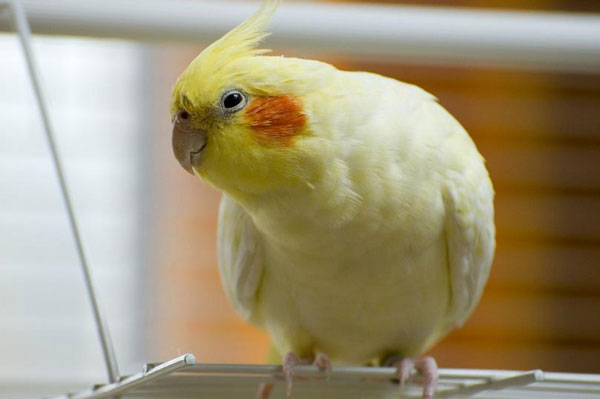
Thus, it is very important to be able to read their body language to identify whether they are stressed or not.
Aggression
Sudden aggression is a warning sign of stress in cockatiels. In general, cockatiels are not aggressive birds, so if yours acts aggressively, it may be a sign that it is under stress.
Tiredness
Another indication of stress could be a destructive behavior within your cockatiel. Without adequate stimulation, cockatiels may grow restless or frustrated. As a result, it begins to damage its surroundings, such as its cage, feeding bowl, its bed, or even itself.
Vocal
Additionally, it may indicate stress if a cockatiel suddenly cries out or flaps its wings in the absence of any danger. On the other side, if your cockatiel displays unusually low vocalization or declines to sing, talk, or dance, this could also be a sign of stress.
Since cockatiels are boisterous birds, if one is acting unusually quiet, something is undoubtedly bothering it.
Reasons To Why Your Cockatiel May Get Stressed
There could be a variety of causes for your cockatiel’s stress. It’s crucial to recognize these issues and address them one at a time until your bird begins to act better.
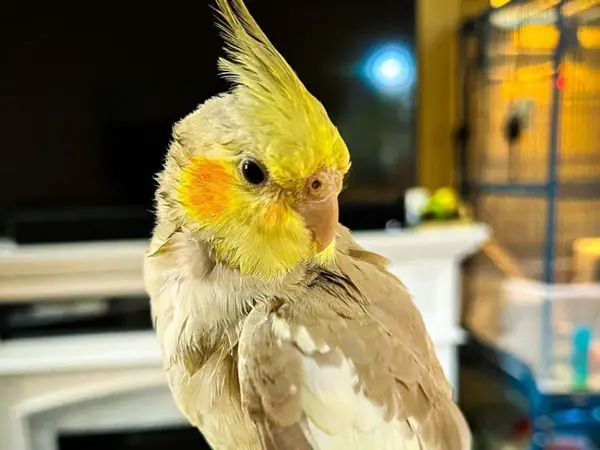
Loud Noises
First off, sudden loud noises may stress out your cockatiel. This occurs because the cockatiel perceives a sudden noise as an impending attack. Because they are still wild animals, cockatiels cannot control their instincts.
Your bird will become anxious if there are any sudden loud noises, such as sirens, loud cars, fireworks, or even just a baby screaming. Additionally, exposing it to these sounds repeatedly could harm them.
Lack Of Rest
Second, excessive engagement may cause cockatiels to get stressed. It can be anxious when a new bird is put in the cage or there is too much activity around.
Cockatiels are lively birds, but forcing them to talk or sing, or simply engaging with them frequently, can make them uncomfortable. This can be quickly determined by examining whether your bird is attempting to flee or hide.
Environment
Changing your cockatiel’s toys or moving its cage can cause stress in your cockatiel. Cockatiels are extremely vigilant, and new toys might act as a threat to your pet bird.
Moving your bird’s cage to a new location might make them stressed as well. If its cage needs to be moved, try covering it with something and revealing it slowly, so that it can slowly familiarize itself with the new environment.
Even moving your bird’s cage to a different corner of the same room may cause stress!
Ways To Reduce Stress In Your Cockatiel
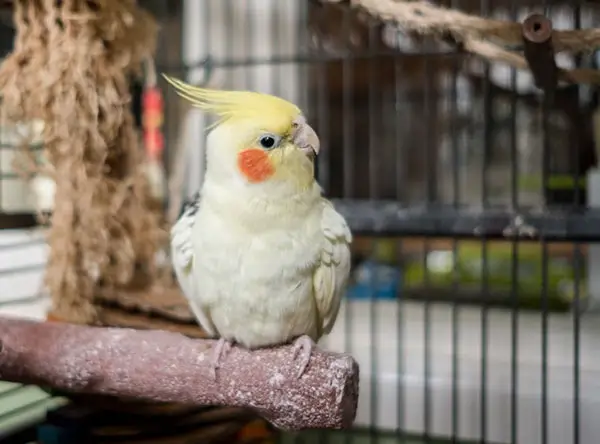
There are several things you can try to reduce stress in your cockatiel.
- Try keeping your cockatiel’s cage away from the window to avoid loud noises.
- Keep your cockatiel’s environment the same. Your cockatiel may become stressed out by changes to its environment, such as new furniture or even a difference in the color of the walls.
- Keep your cockatiel away from noisy or over-interactive guests, as your bird can get overwhelmed by all the interactions.
- Keep your cockatiel away from dogs or cats, as they might feel threatened by them as they can’t fly away inside a cage. A cockatiel can’t comprehend that the cage is protecting it.
- Let your cockatiel move around, fly and explore the house freely once in a while.
FAQs
After learning everything there is to know about cockatiels and stress, let’s look at some frequently asked questions. It will undoubtedly answer some more queries you might have.
Yes, if they are under stress for a prolonged period, their health may decline to a point where it eventually dies.
Yes. Cockatiels want to move around and fly, engaging in new activities as they naturally would in the wild. Therefore, keeping them confined and preventing them from stretching their wings might make them stressed.
Cockatiels generally hiss when they feel threatened, annoyed, or irritated. It is best to leave your bird alone for some time and not interact with it when it hisses.
Outro
Cockatiels are loud, playful birds, and we don’t want stress to get in their way. Thus it is very important to identify stress in them and act as soon as possible. Thus we hope now you know how to tell if a cockatiel is stressed.
Cockatiels are very conscious about their surroundings. Stress in cockatiels mainly occurs from abrupt changes in their environment. Therefore, it is very important to maintain a safe environment for your feathered friend.
By trying all methods discussed above to reduce anything and everything that might cause stress, you can keep your cockatiel content. With that being said, I hope you’ll be able to look after your bird!
